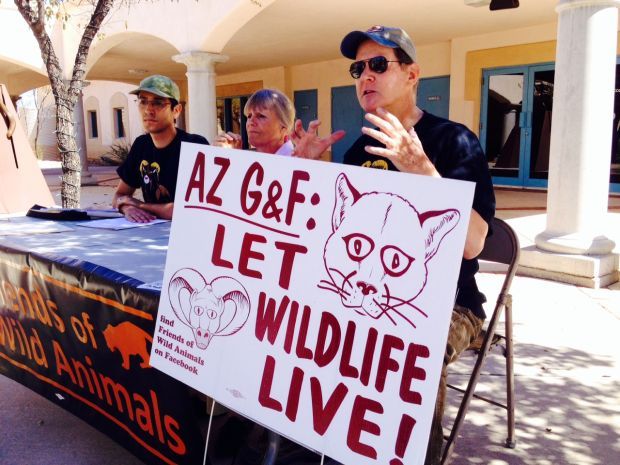A bighorn sheep reintroduction project that has brought the deaths of 15 bighorns and three mountain lions in the Catalina Mountains is a futile “crazy program” that will only lead to more dead animals, a spokesman for opponents of the project said Friday.
“The only way the (Arizona) Game and Fish Department can maintain a bighorn herd in the Catalinas is to kill mountain lions” that prey on sheep, said Rich Small of the Friends of Wild Animals group. “It’s a vicious cycle.”
Members of the Friends of Wild Animals and a group called Supporting and Promoting Ethics for the Animal Kingdom (SPEAK) held a news conference outside Oro Valley town offices where the Arizona Game and Fish Commission was meeting.
Speakers from both groups strongly criticized the reintroduction of 31 bighorns — brought to the Catalinas from the Yuma area in November in an effort to rebuild a bighorn herd that died out in the range north of Tucson. They also called for an end to the killing of mountain lions that prey on sheep.
Game and Fish spokesmen defended the project and emphasized that wildlife officers were taking a “surgical” approach to mountain-lion control — killing a very limited number of lions to increase survival chances for bighorns.
Ben Pachano, a member of the Friends group, said: “The bighorn reintroduction program has had plenty to announce in the past few weeks, none of it good.
“They’ve now lost at least 15 sheep, which includes half the adults and all but two of the rams,” Pachano said. “They’ve hunted and killed (three) mountain lions simply for doing what lions do: eating sheep.
“What will it take to declare this program a failure?” Pachano said. “How many more sheep and mountain lions will have to die?”
Pachano and Deborah Thompson, spokeswoman for SPEAK, said the department is catering to its “customers” — hunters — by trying to create a bighorn population that eventually could be hunted.
Joe Sacco, a spokesman for Game and Fish, said the agency is using “the most conservative practices possible” in managing the project in cooperation with a citizens advisory committee.
“I’d be perfectly happy if we didn’t have to kill another lion,” Sacco said. “But we realized that the sheep would need that help, at least early on.”
Mark Hart, another department spokesman, said that “this notion that we’re just doing this so people can hunt bighorns is unfair. We’re committed to restoring native species to their historic habitat wherever we can.”
Hunting, Hart said, is “really closely regulated. There are about 6,000 bighorns in the state. Last year we issued 104 tags” for hunting bighorns.
Sacco said future plans for the project are re-evaluated as circumstances unfold.
Pachano said the wildlife groups plan to hold a protest of the project at 10 a.m. to day outside the Oro Valley town offices at 11000 N. La Cañada Drive.





